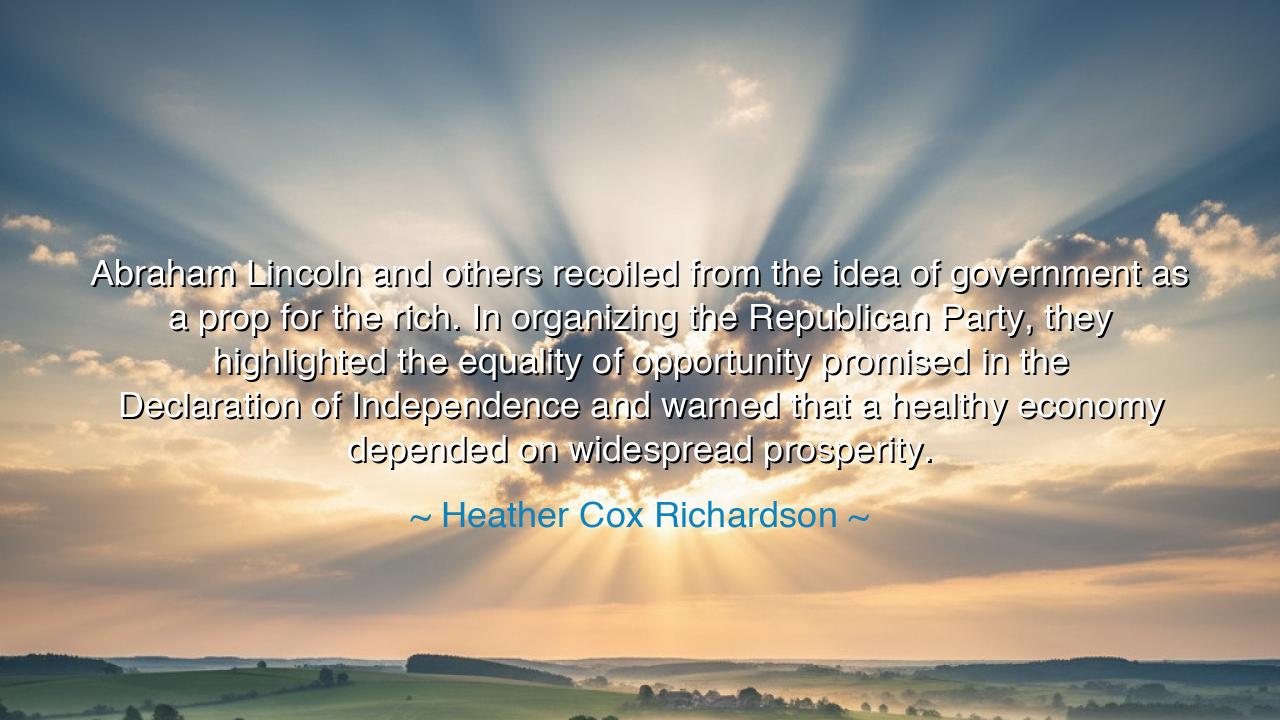
Abraham Lincoln and others recoiled from the idea of government
Abraham Lincoln and others recoiled from the idea of government as a prop for the rich. In organizing the Republican Party, they highlighted the equality of opportunity promised in the Declaration of Independence and warned that a healthy economy depended on widespread prosperity.






Hear now, children of memory, these words of Heather Cox Richardson: “Abraham Lincoln and others recoiled from the idea of government as a prop for the rich. In organizing the Republican Party, they highlighted the equality of opportunity promised in the Declaration of Independence and warned that a healthy economy depended on widespread prosperity.” In them lies a deep warning, a hopeful flame, and a reminder: that government is meant to lift the many, not to prop up the few.
Long ago, when the American republic was young and the wounds of slavery and division ran fierce, leaders like Lincoln perceived a peril: that power, untethered, would drift toward the wealthy and the privileged. They recoiled at the notion that the state might become an instrument not of justice, but of favoritism — a prop for the rich. To them, that would be a betrayal of the very ideal of equality on which the nation was founded. They sought instead to craft a government that served not the few, but the many — that upheld opportunity for all, not advantage for a caste.
In raising the banner of the Republican Party, these founders insisted that the promise of the Declaration of Independence — that all are created equal — must not remain a rhetorical flourish, but become real in the lives of citizens. They believed that no man, born in toil or in poverty, should be shut out from advancement by entrenched privilege. That vision — that the ladder of possibility should reach every hand — became central to their cause. But they also acknowledged a deeper truth: that an economy is not healthy if its wealth is hoarded at the top, but only when prosperity is widespread, touching farms, workshops, markets, and homes across the land.
Consider the enactment of the Homestead Act of 1862: under Lincoln’s administration, millions of acres of western land were made available to ordinary citizens, enabling families to build farms, homes, and futures from nothing. That measure embodied the very principle spoked of — that government must create conditions for ordinary people to rise. And when the Civil War wrought the emancipation of millions of enslaved people, the promise was not just freedom, but the possibility of making one’s own life with dignity. These were not acts of charity; they were the machinery of justice, woven into law.
Yet the path was never smooth. In later decades, the Republican Party, like all human institutions, would sometimes stray from its founding ideals — gravitating toward alliances with industrial magnates, accepting the influence of capital, or privileging the interests of the few over the many. Richardson’s history warns us of that ebb and flow — that the tension between equality of opportunity and protection of property has haunted American politics ever since.
From this reflection emerges a lesson as old as any polity: a just government must remain vigilant against its own corruption. The servitude to money and influence may creep in silently, until the people find themselves beholden to those who whispered promises in power’s ear. A healthy nation cannot be built on the fortunes of the few; it must be rooted in the flourishing of the many.
Therefore, let this be our call: champion policies that distribute opportunity, not privilege. Support laws that widen access to education, to land, to capital, to healthcare. Demand accountability from leaders who would tilt the field in favor of elites. And cultivate in your heart the conviction that true prosperity is shared prosperity. For when the many rise, the nation rises — and the dream Lincoln and others carried forward will not be buried under the weight of wealth, but will bloom in every life that dares to climb.






AAdministratorAdministrator
Welcome, honored guests. Please leave a comment, we will respond soon